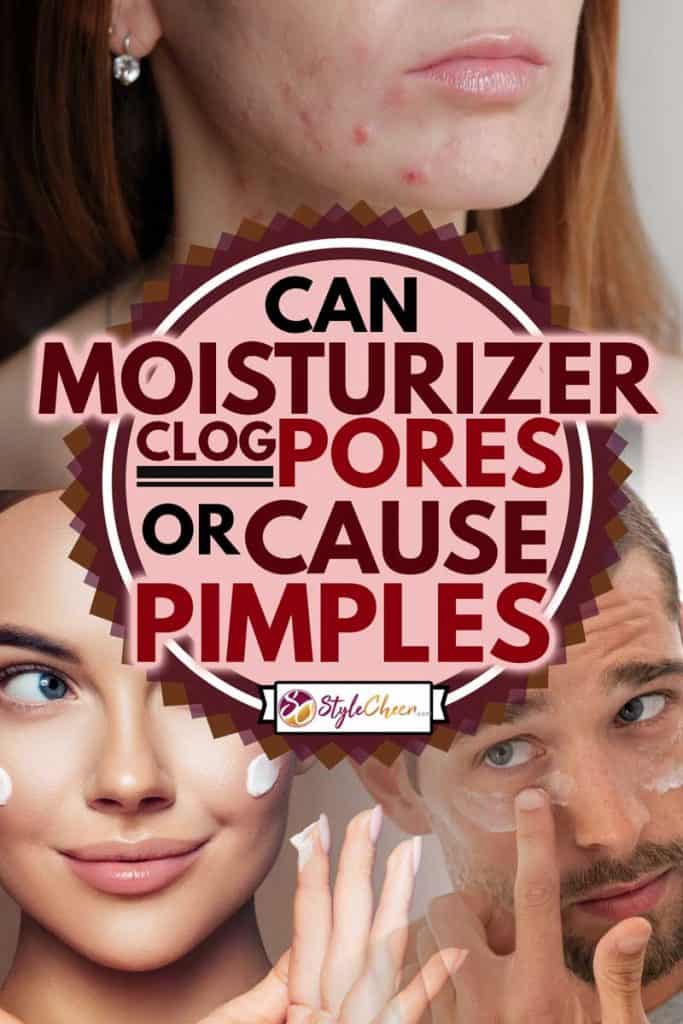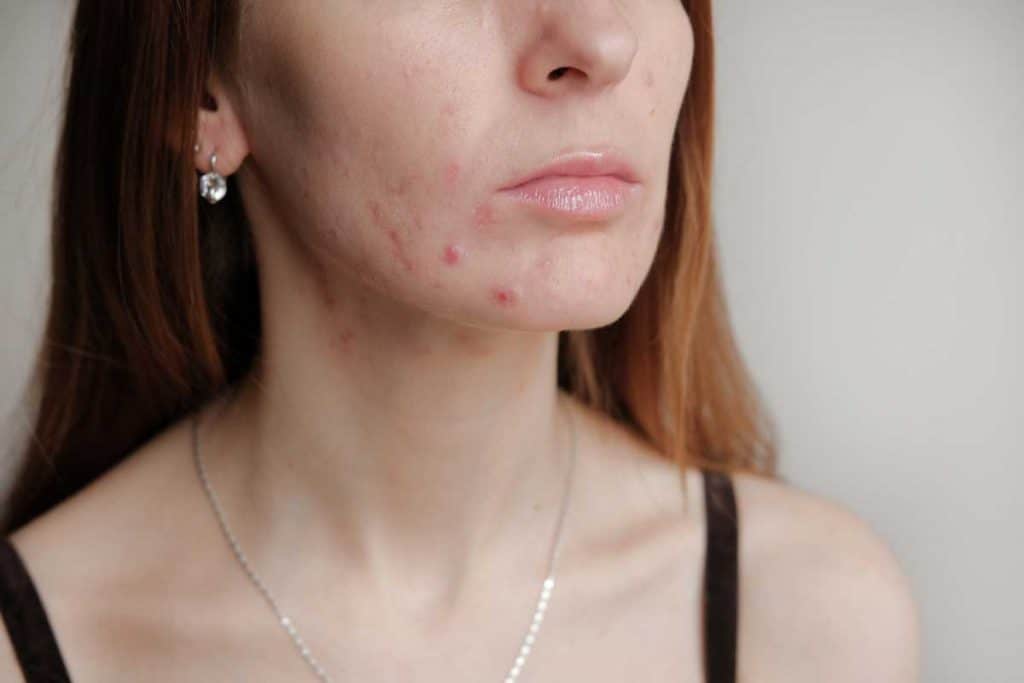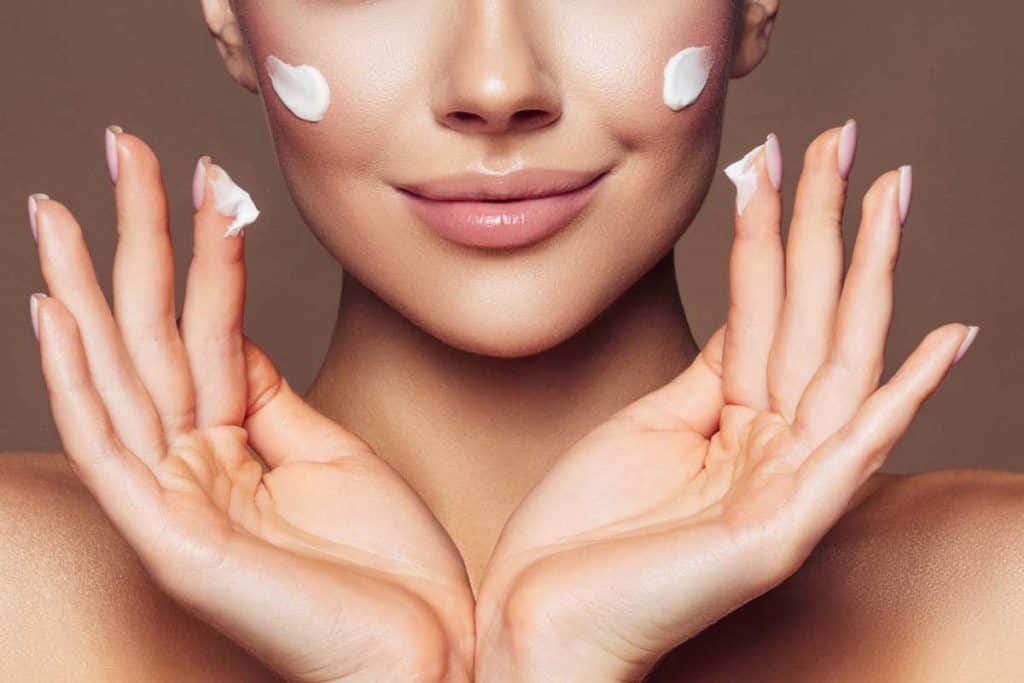Moisturizing is an essential step in skincare, but do you sometimes feel like your skin has more breakouts when you use moisturizer? We researched everything you need to know about choosing the best moisturizer and how to minimize breakouts, including specific product recommendations.
Some moisturizers can cause pimples. If your skin is prone to breakouts, some products are better than others.
Choosing the right product for your skin will reduce pimples and give you the healthy glow that you are looking for. Keep reading for all of the details to help you determine what your skin needs.

This article may include affiliate links and elements that were carefully created by our team using advanced ai to help you envision the best style advice.
How to Choose the Correct Moisturizer For Your Skin Type
There are three basic formulas of moisturizers.
- Humectants
- Emollients
- Occlusives
If your skin is acne-prone, choosing a moisturizer can be tricky. Knowing the properties of the three basic types of moisturizers and how they interact with your skin can keep you looking your best. You may wonder if you even need a moisturizer if your skin is acne-prone. Hint - you d! but choosing the right one is the key. Read on to learn about the three types of moisturizers and when to use each one, plus our top 5 picks for moisturizer best suited for oily skin.
Humectants
Humectants draw water into the top layer of the skin and also bind moisture to the skin to keep in on the surface. They'll absorb quickly and are usually a lightweight consistency. When you're looking at a label, the ingredients you'll see listed in a humectant are things like:
- glycerin
- hyaluronic acid
- propylene glycol
- urea
- sorbitol
- alpha hydroxy acids
- aloe vera
Urea and alpha-hydroxy acid is excellent for softening the skin, but may also cause some exfoliation. Humectant moisturizers are great for oiler skin types and can be found as gels, creams, or liquids. A gel formula is best for oily skin.
Click here to see this moisturizer on Amazon.
Emollients
Emollients seal water into the skin, plumping out wrinkles and softening and smoothing the skin. Emollients help repair the skin and are best for normal, dry, or combination skin types. They come in creamy or lotion based formulas.
Ingredients you'll find in emollients include:
- lanolin
- mineral oil
- ceramides
- dimethicone
- rosehip
- coconut or other plant-based oils
Click here to see this moisturizer on Amazon.
Occlusives
Occlusives form a thick barrier to prevent water loss from the skin. Occlusives are best used on parts of the body with thicker skin like the knees, elbows, hands, and feet. The ingredients you'll see in an occlusive are:
- shea butter
- petrolatum
- beeswax or paraffin
Occlusives are great for dry and mature skin types. An occlusive would be much too heavy for acne-prone skin. Avoid using this on your face. These products are available in a thick cream or balm.
Click here to see this product on Amazon.
As mentioned above, the consistency of the moisturizer will also affect your skin. There are three main types of moisturizer formulas:
- Gel
- Creams
- Liquids or lotions
Gel
Gel formulas are best for oily or acne-prone skin. They tend to be lighter and less occlusive than creams or lotions. Gels contain water and hydrate the skin by absorbing quickly without leaving a greasy feeling.
Click here to see this gel moisturizer on Amazon.
Creams
Cream formulas work well for dry and combination skin. Cream is the best formula sealing in moisture and works well for irritated skin as well.
Click here to see the cream on Amazon.
Lotions
Liquid and lotion formulas are great for combination skin and can also be used on some oily skin types. To avoid pimples choose a formula labeled "non-comedogenic". This means the product is designed not to clog your pores.
Click here to see this lotion on Amazon.
What Causes Pimples?
Pimples are caused by the pores of your skin becoming blocked with oil or dead skin. The pore becomes infected with bacteria leading to a red pimple or pustule. There are several different types of pimples.
- Whiteheads: small pimples under the skin that have a white or flesh-toned color.
- Blackheads: a black or dark-colored spot on the skin surface.
- Papules: a small round bump, usually red or pink.
- Pustules: a pimple that has filled with pus on the red base.
- Nodules: similar to a papule, but a little larger and deeper into the skin.
- Cysts: a larger and more painful pimple, also filled with pus. These often cause scarring.

Steps You Can Take to Reduce Pimples
- Wash your face regularly with a mild, gentle cleanser.
- Know your skin type. This helps you choose the right products.
- Moisturize your skin. Look for a fragrance-free, non-comedogenic product.
- Drink lots of water. If you are a little dehydrated, your skin will produce more oil to try to keep it hydrated. More oil leads to more pimples.
- Limit makeup. Makeup can clog pores and make pimples even worse.
- Avoid touching your face. Always touching your face adds oil to your skin and may also transfer bacteria.
What Happens if I Don't Moisturize My Face?
If you skip moisturizer, your skin will dry out. This can lead to dull, dry, flakey skin. It might seem like those with acne-prone skin may not need moisturizer, but this is not true. Your skin will try to moisturize itself by producing even more oil, which can clog pores and cause pimples. By using a lightweight moisturizer, you'll keep your skin looking it's very best.
Without adequate moisture, your skin will be more prone to wrinkles from drying out, and any wrinkles you already have will look deeper. Applying moisturizer is critical for smoothing wrinkles and keeping them from getting deeper.
Should You Moisturize Oily Skin?

Even skin that is oily needs moisture. If your skin remains too dry, it will produce even more oil to try to soothe it. This causes even further breakouts. By providing the right amount of light moisture, you can decrease acne.
Light hydration is the best way to moisturize oily skin. Avoid heavy or oil-based products. Choose a product that will absorb quickly instead of lying on top of your skin.
What Are the Best Moisturizers That Won't Clog Pores?
Neutrogena Oil-Free Acne Moisturizer
This oil-free moisturizer is excellent for acne-prone skin. It's a lightweight formula that also contains salicylic acid. This makes it a great choice for breakouts since the salicylic acid will dry up acne while also providing light moisture.
Click here to see this moisturizer on Amazon.
Daily Greens Oil-Free Gel Moisturizer
This moisturizer checks all the boxes for oily skin - its a gel formula and oil-free. It also contains a papaya enzyme for gentle exfoliation and then replenishes moisture with hyaluronic acid.
Click here to see this moisturizer on Amazon.
La Roche-Posay Effaclar Mat
La Roche-Posay Effaclar Mat is a formula that is dermatologist recommended for oily skin. Not only is it oil-free, but it's a mattifying formula. That means it soaks up shine to give your skin an even tone.
Click here to see this moisturizer on Amazon.
Cetaphil Moisturizing Lotion
Here's an excellent moisturizer for skin that is both sensitive and prone to breakouts. It's dermatologist-recommended at a very affordable price point.
Click here to see this moisturizer on Amazon.
Neutrogena Hydro Boost Water Gel with Sunscreen
Finally, this pick is a gel formula that is non-comedogenic and also contains sunscreen. It's a great pick for a lightweight daily moisturizer for active lifestyles. If you spend a lot of time in the sun, you may want to check out our post on "Can you Use After-Sun as a Daily Moisturiser?".
Click here to see this moisturizer on Amazon.
Caring for your skin doesn't need to be complicated when you know the secrets! First, learn your skin type, which will guide you in product selection. Even oily skin needs moisture. You can avoid pimples with the application of the right product for your skin type. Use our product recommendations to help you choose the best moisturizer for your skin.
If you want to learn how you can add a serum to your skincare routine, check out our post on "How to Use Vitamin C Serum".












![Scientist holding Cyanoacrylate glue, Is There An Eyelash Glue Without Cyanoacrylate? [A Guide to Finding Safe Alternatives] - 1600x900](https://stylecheer.com/wp-content/uploads/2023/09/shutterstock_2238414685-300x169.jpg)
![Applying lash glue onto fake eyelashes, Why Is My Lash Glue Not Sticking? [Common Reasons and Solutions] - 1600x900](https://stylecheer.com/wp-content/uploads/2023/09/shutterstock_1059533828-300x169.jpg)
![Pouring black lash glue onto a small mat, What Glue Do Lash Techs Use? [A Guide to Lash Extension Adhesives] - 1600x900](https://stylecheer.com/wp-content/uploads/2023/09/shutterstock_1541038103-300x169.jpg)